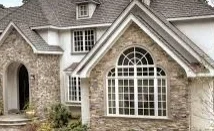Stone homes (sort of) are popping up all over the Triangle (Raleigh, Durham and Chapel Hill) area of North Carolina. Manufactured stone is a lightweight, man-made concrete masonry product that is cast into random sizes in a variety of colors and finishes meant to mimic the look of quarried rock. It is generally applied as a masonry veneer to exterior and interior walls, columns and landscape structures.
As experienced in the 80’s and 90’s with Exterior Insulation and Finish System (EIFS or “synthetic stucco”), improper installation of manufactured stone veneer on exterior walls has sometimes lead to structural damage due to water intrusion. The stone cladding is not meant to be a waterproof barrier and should be installed so as to create a drainage plane between it and the underlying structure. Any moisture that enters the plane MUST exit above windows, doors and the foundation through a weep system.
Unfortunately, it is difficult to verify that stone veneer was installed according to the manufacture’s instructions. Details such as sealant behind the flashing, the makeup of the water resistant barrier and proper lapping of materials is not readily apparent. More visible and often overlooked recommendations are a weep system atop the foundation and proper clearance between the stone cladding and the roof covering, ground or dissimilar materials.
The presence of stone veneer is not a reason to avoid a home, but extra due diligence is advised. If you’re purchasing a new home, require that the builder’s warranty of the home extend as long as possible for structural issues and specifically the installation of the veneer. If you’re considering a resale, ask the seller to disclose all information they have regarding installation of the cladding system. The consequences of improper installation can be severe, so it is advisable to request a review by a specialist with considerable experience in and comprehensive knowledge of stone veneer.
A visual inspection alone prohibits a home inspector from confirming that hidden construction techniques are sound. We’ll look for signs and provide our best assessment so that you are making an informed decision. As an owner, diligent monitoring of interior areas is required. Contact a licensed general contractor at the first sign of water intrusion.
The information provided here is based on extensive research, but I am an inspector - not a licensed contractor. Always consult a licensed contractor regarding a particular installation.

